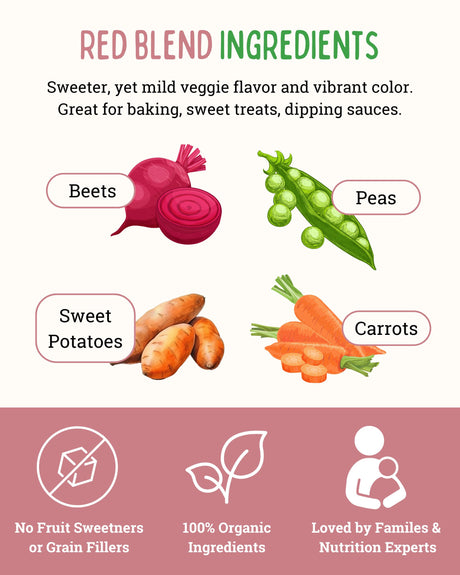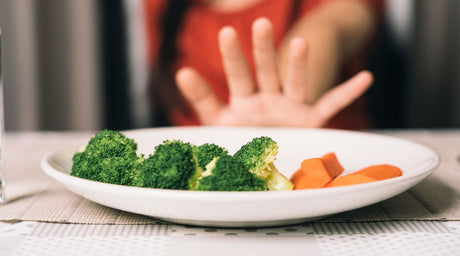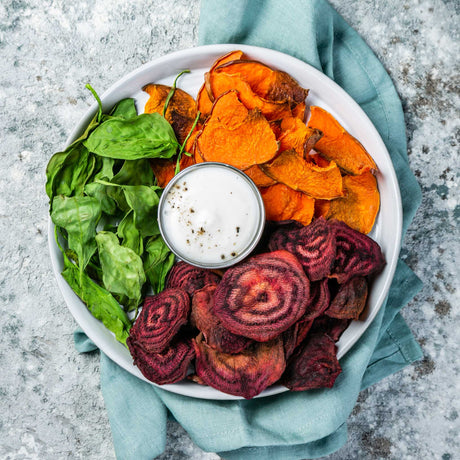Kids in Motion: The Rise of Youth Sports
In today's fast-paced world, it's heartening to see a surge in kids embracing sports and physical activities. From soccer leagues to gymnastics classes, children are lacing up their shoes, diving into pools, and hitting the fields with gusto.
This uptick isn't just about staying active; it's also about building teamwork, discipline, and resilience.
Fueling Young Champions: The Nutritional Side of the Game
But as our little athletes sprint, jump, and twirl, their bodies demand a unique kind of fuel. Young athletes have distinct nutritional needs that set them apart from their less active peers.
It's not just about eating more; it's about eating right. As they push their limits, their muscles, bones, and brains require a precise balance of nutrients to ensure they perform at their best and recover efficiently.
As parents and caregivers, understanding these needs is the first step in supporting their athletic journey.
Understanding the Nutritional Needs of Active Kids
Powering Up: The Elevated Energy Needs
Active children, especially those engaged in sports, have energy demands that surpass those of their sedentary counterparts. It's not just about the hours they spend practicing or competing; it's also about the energy their bodies expend to repair and grow.
As they sprint, leap, or swim, they burn calories at an accelerated rate, making their dietary needs paramount to sustain their activities and support their growth.
Macronutrients: The Big Three for Performance
Carbohydrates: Often dubbed the body's primary energy source, carbohydrates are crucial for active kids. They fuel muscles, ensuring that young athletes have the stamina to run that extra mile or score that last-minute goal.
Proteins: Beyond muscle building, proteins play a role in repairing tissues, especially after rigorous training sessions. For young athletes, this means quicker recovery times and reduced muscle soreness.
Fats: While often misunderstood, fats are essential for energy, especially during prolonged activities. They also aid in the absorption of certain vitamins, making them a key player in an athlete's diet.
Micronutrients: The Unsung Heroes of Recovery
While macronutrients often steal the spotlight, micronutrients play a pivotal role in an athlete's performance and recovery. Minerals like iron, which helps transport oxygen to muscles, and calcium, crucial for bone health, are vital.
Vitamins, especially B-vitamins, support energy production, ensuring that our young champions have the vigor to tackle their next challenge. Ensuring a diet rich in these micronutrients not only boosts performance but also fortifies their overall health.
Fueling Up: Pre-Workout Nutrition
Carbohydrates: The Quick Energy Boosters
Before a workout or sports activity, the body craves an energy source that's easily accessible and quick to burn. Enter carbohydrates. These are the body's preferred source of fuel, especially during high-intensity activities.
For young athletes, having a carb-rich snack before their activity ensures they have the energy reserves to perform at their best, preventing early fatigue and keeping their spirits high.
Timing is Everything: When to Snack
The ideal time for a pre-workout snack is about 30 minutes to an hour before the activity. This window allows the body to digest the food and convert it into ready-to-use energy.
It's essential to strike a balance - eat too early, and the energy might wane mid-activity; eat too late, and there might be discomfort during the workout.
Snack Ideas to Kickstart the Action
Looking for some snack inspiration? Here are a few ideas that combine the goodness of carbohydrates with a touch of protein and healthy fats:
Banana with Almond Butter: The natural sugars in bananas provide a quick energy boost, while almond butter adds a touch of protein and healthy fats.

Whole Grain Crackers with Hummus: The crackers offer the much-needed carbs, and the hummus brings in protein and a rich flavor, making it a delightful and nutritious combo.
Greek Yogurt and Berries: A creamy blend of protein-rich Greek yogurt paired with antioxidant-packed berries offers both immediate and sustained energy.
Oatmeal topped with Dried Fruits: Oats are a great source of complex carbs, and when combined with dried fruits like raisins or apricots, they provide a sustained energy release.
Rice Cakes with Avocado: A light yet energy-packed snack, the carbs from the rice cakes and the healthy fats from the avocado make for a balanced pre-workout bite.
Remember, the goal is to provide young athletes with easily digestible energy that will fuel their activities without weighing them down.
Recovery and Repair: Post-Workout Nutrition
Protein: The Building Blocks of Recovery
After an intense workout or sports session, the muscles experience tiny tears, especially during strength training or prolonged activities. It sounds alarming, but it's a natural process and is actually the way muscles grow and strengthen.
Enter protein. This macronutrient plays a pivotal role in repairing and rebuilding these muscle fibers, ensuring that young athletes recover efficiently and are ready for their next bout of physical activity. Without adequate protein, recovery can be slower, and the risk of injuries might increase.
Carbohydrates: Refueling the Energy Tanks
While protein is busy repairing muscles, carbohydrates step in to refuel the body's energy reserves, specifically the glycogen stores in muscles. Glycogen is the primary fuel source during workouts, and after prolonged activity, these stores get depleted.
By consuming carbs post-workout, young athletes ensure that their energy reserves are topped up, reducing fatigue and preparing them for their next session.
Snack Ideas for Speedy Recovery
Post-workout nutrition is all about the right balance of protein and carbs to kickstart the recovery process. Here are some snack ideas that hit the mark:
Chocolate Milk: A classic post-workout drink, chocolate milk offers a blend of carbs and protein, making it an excellent recovery drink. Plus, it's a favorite among kids!
Yogurt with Berries: Creamy yogurt provides the protein punch, while berries, rich in antioxidants, add carbs and help combat exercise-induced oxidative stress.

Turkey Sandwich on Whole Grain Bread: Lean turkey is a great protein source, and when paired with whole grain bread, it provides the necessary carbs to refuel energy stores.
Peanut Butter and Banana on Whole Wheat Toast: This combo offers a mix of protein, healthy fats, and carbs, ensuring a well-rounded recovery.
Remember, post-workout nutrition is crucial in supporting the hard work young athletes put in during their activities. By offering them balanced snacks, parents can ensure their kids bounce back faster and stronger.
Hydration: More Than Just Water
The Lifeline of Athletic Performance
Hydration isn't just about quenching thirst; it's the lifeline of athletic performance, especially for young, active bodies. Every cell, tissue, and organ in our body needs water to function correctly.
For young athletes, staying hydrated ensures that their muscles receive the oxygen-rich blood they need to perform, regulates body temperature, and helps with the recovery process post-activity. In essence, water is to the body what oil is to a machine, ensuring everything runs smoothly and efficiently.
Spotting the Signs of Dehydration
Kids often get so engrossed in their activities that they forget to drink water, making them susceptible to dehydration. Parents and coaches should be vigilant and look out for signs such as dry or sticky mouth, dark yellow urine, or complaints of headache or dizziness.
In more severe cases, dehydration can lead to heat-related illnesses like heat exhaustion or heat stroke, which can be serious. It's essential to educate kids about these signs so they can recognize when they need to hydrate.
Water vs. Sports Drinks: Making the Right Choice
While water is the go-to for hydration, there are times when sports drinks might be more appropriate. These beverages are designed to replenish not just fluids but also electrolytes like sodium and potassium, which are lost in sweat.
If a child is engaged in prolonged, intense physical activity, especially in hot and humid conditions, a sports drink can help restore this balance. However, it's essential to choose wisely.
Many sports drinks on the market are loaded with sugars and artificial additives. Parents should opt for those with minimal added sugars and natural ingredients. And remember, for regular play or short activities, good old water is still the best choice.

Balanced Meals for Active Kids
The Cornerstone of Sustained Energy and Growth
Every sprint, jump, and playful chase demands energy. For our young athletes, a well-rounded diet is the secret sauce to fueling these activities and supporting their rapid growth. It's not just about the immediate energy for the next game; it's about laying the foundation for a lifetime of health and vitality.
The Magic Trio: Carbs, Proteins, and Fats
Carbohydrates for quick energy, proteins for muscle repair, and fats for long-lasting fuel - this trio is non-negotiable for active kids. Ensuring each meal offers a good mix of these macronutrients can be the difference between a child who's raring to go and one who's feeling sluggish.
Meal Ideas to Keep Them Going
Crafting meals for active youngsters is about combining nutrition with flavors they love. Here are some ideas to get you started:
Grilled Chicken Delight: A juicy grilled chicken breast, paired with fluffy quinoa and a rainbow of steamed veggies. It's a protein-packed meal with a good dose of complex carbs.
Pasta Pleaser: Whole grain pasta serves as a fantastic base. Top it with lean beef in a rich tomato sauce, and you've got a meal that's both nutritious and kid-approved.
Fish Fiesta: Grilled or baked salmon with a drizzle of lemon, served alongside roasted sweet potatoes and green beans. Omega-3s for brain health and carbs for energy make this a winner.
Tofu Twist: For a plant-based option, stir-fry tofu cubes with a medley of bell peppers, broccoli, and snap peas. Serve over brown rice for a protein and fiber-rich meal.
Turkey Taco Night: Use lean ground turkey to make taco filling, and let the kids have fun assembling their tacos with whole grain tortillas, lettuce, tomatoes, and a sprinkle of cheese. It's interactive and nutritious!

Rotating between these meals ensures a variety of nutrients and keeps mealtime exciting. After all, nutrition is as much about exploration as it is about sustenance.
Navigating the World of Sports Drinks and Supplements
Beyond the Flashy Ads: The Real Deal with Sports Drinks
It's hard to miss them. Those vibrant bottles, endorsed by top athletes, promising to boost performance and keep our young ones hydrated.
But here's the thing: while sports drinks might have their place, they're not always the magic solution they're marketed to be. Many are loaded with sugars and artificial additives, which might do more harm than good, especially when consumed regularly.
Supplements: A Cautionary Tale
The supplement aisle can be a minefield. From powders promising muscle growth to pills ensuring quicker recovery, the choices are endless.
But not all supplements are created equal. Some might contain ingredients that aren't listed on the label, while others could have substances that are potentially harmful to kids. It's essential to tread with caution and be informed.
When is it Okay to Opt for Sports Drinks or Supplements?
There's no one-size-fits-all answer. For kids engaged in prolonged, high-intensity activities, especially in hot climates, a sports drink might help replace lost electrolytes. But for a regular play session in the backyard? Water usually does the trick.
As for supplements, it's crucial to consult with a pediatrician or nutritionist. They can provide guidance tailored to your child's specific needs and ensure safety. Remember, while these products might offer a quick fix, nothing beats the benefits of a balanced diet and proper hydration.
Common Concerns and Myths Debunked
The Protein Powder Predicament
It's a scene we've all witnessed: the young athlete, post-workout, shaking up their bottle filled with the latest protein powder. But do our kids really need that extra protein boost?
While protein is undeniably essential for muscle repair and growth, most kids get enough from their regular diets. Moreover, some protein powders might contain additives and sugars that aren't ideal for young bodies. It's always best to aim for whole food sources of protein like lean meats, dairy, and legumes.
Energy Bars: A Meal Replacement?
Energy bars have become the go-to snack for many active kids. Convenient? Absolutely. Nutritionally sound? Not always.
While some bars can offer a decent mix of carbs, protein, and fats, others are glorified candy bars in disguise. It's essential to read labels and understand what you're feeding your child. Remember, a homemade trail mix or a piece of fruit with some nuts might serve just as well, if not better.
The Sugary Truth Behind Sports Drinks
Let's address the elephant in the room: sugar in sports drinks. Yes, these beverages can replenish lost electrolytes during intense physical activity. But many are laden with sugars that can quickly add up, especially if your child is sipping on them throughout the day.
It's crucial to differentiate between the needs of a child playing a 90-minute soccer game in the heat and one having a casual playdate. Hydration is vital, but often, good old water is the best choice. If you do opt for a sports drink, consider diluting it to reduce the sugar content.
Final Thoughts
Whole Foods: The Gold Standard for Active Kids
As we've journeyed through the nutritional landscape for active youngsters, one truth stands out: natural, whole foods remain the gold standard.
While the allure of quick fixes and marketed "performance enhancers" can be tempting, nothing quite matches the nutritional punch of fresh, unprocessed foods. These foods not only fuel our kids' bodies but also support their overall growth and development.
Stay Informed and Seek Expertise
For parents navigating this journey, staying informed is crucial. The world of children's nutrition is ever-evolving, with new products and trends emerging regularly. While some of these might offer genuine benefits, others might be mere marketing gimmicks.
When in doubt, consulting with a nutritionist or pediatrician can provide personalized advice tailored to your child's specific needs. Remember, every child is unique, and what works for one might not necessarily work for another. Your dedication to understanding and supporting your child's nutritional needs is a testament to the love and care you provide.
Keep asking questions, keep learning, and most importantly, trust your instincts.













